 |
|
Omar
Touqan, Economic and Social Commission for Western Asia
(ESCWA), Kamal Sanada, Economic Department, Arab League, Chair Abdulla
Abdulrahman Al-Aryani, Minister of Tourism and Environment, Yemen,
Prince Fahd bin Abdallah Al Saud, Saudi Arabia, Chairman of the
Executive Bureau of the Council of Arab Ministers Responsible for
the Environment, and Shafqat Kakahel, Deputy Executive Director,
UNEP
|
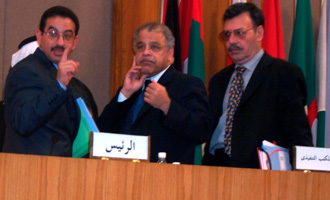 Abdulla
Abdulrahman Al-Aryani, Minister of Tourism of Environment of Yemen
and Chairman of the 13th Session of CAMRE (left),
called the West Asia Preparatory Committee Meeting to order at 5:15
PM He recalled the definition of sustainable development, noted
the challenges to the realization of sustainable development including
urbanization and the need to link social, economic and environmental
aspects for positive impact, drew attention to the Ministerial meeting
of March 2002 Arab Summit in Beirut and said there is need to establish
a mechanism to finance programmes on sustainable development. Noting
that an atmosphere of stability based on partnership and equity
is important for the attainment of sustainable development, he expressed
interest in regional and international cooperation for peace and
security. Photo: Chair Abdulla Abdulrahman Al-Aryani, Mahmood
Yousef Abdulraheem, UNEP Regional Office for West Asia and Shafqat
Kakahel (right) Abdulla
Abdulrahman Al-Aryani, Minister of Tourism of Environment of Yemen
and Chairman of the 13th Session of CAMRE (left),
called the West Asia Preparatory Committee Meeting to order at 5:15
PM He recalled the definition of sustainable development, noted
the challenges to the realization of sustainable development including
urbanization and the need to link social, economic and environmental
aspects for positive impact, drew attention to the Ministerial meeting
of March 2002 Arab Summit in Beirut and said there is need to establish
a mechanism to finance programmes on sustainable development. Noting
that an atmosphere of stability based on partnership and equity
is important for the attainment of sustainable development, he expressed
interest in regional and international cooperation for peace and
security. Photo: Chair Abdulla Abdulrahman Al-Aryani, Mahmood
Yousef Abdulraheem, UNEP Regional Office for West Asia and Shafqat
Kakahel (right) |
|
|
Prince
Fahd bin Abdallah Al Saud
of the Kingdom of Saudi Arabia, Chair of the Executive Bureau of
CAMRE (left), highlighted
issues important to the region including globalization, the importance
of civil society participation, the need not to separate social
and economic aspects from those of environment, and proposed the
establishment of a regional Ministerial level Arab Council for sustainable
development for the Summit. He stressed establishing a mechanism
to finance programmes on sustainable development and called for:
a preparatory meeting at the level of General Secretariat of these
councils as soon as possible; and the establishment of a world mechanism
for sustainable development and for good governance.
|
|
|
In
his statement, UNEP Deputy Executive Director Shafqat
Kakahel
(right) expressed confidence that the
documents generated through this meeting would reflect the unique
priorities, challenges and determination of the Arab region. Emphasizing
the need for financial and other resources and for the UN system
and other multi-lateral agencies to contribute to regional sustainable
development efforts, Kakahel stated that UNEP would work with ESCWA,
regional partners and other actors to operationalize development
goals.
|
|
|
|
Omar
Touqan, ESCWA (left): highlighted
progress made on, inter alia, boosting the role of women and
increasing the role of NGOs; said political instability is a hindrance
to sustainable development; noted other constraints such as the negative
impact of technology on the environment, consumerism and poverty,
noted the negative impacts and opportunities presented by globalization.
Photo: Omar Touqan, ESCWA, Emad Adly, Arab Network for Environment
and Development (RAED) and Hosny Khordagui, ESCWA |
|
Fatma
Salah El Mallah, League of Arab States (right),
representing the Technical Secretariat, presented the key positions
of the Arab Address, which highlights the following areas:
peace and security, poverty eradication, the debt burden, international
trade, globalization, building research and technological capacity,
governance, population, urban development, health and environment
connections, integrated management of natural resources, industry
and tourism, natural and cultural heritage, and finance Photo:
Kathleen Abdalla, UN Department of Economic and Social Affairs.
|
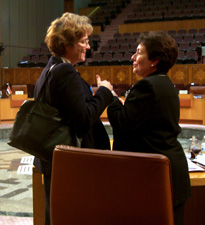 |
|
International
Organizations in the conference room (left) and Omar
Touqan, ESCWA speaks with a delegate during the coffee break
|
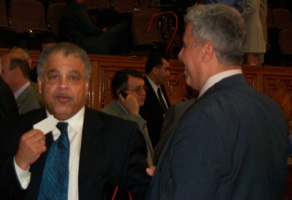 Mahmood
Yousef Abdulraheem, UNEP ROWA (left), presented the Arab Declaration
and described its origins in the Abu Dhabi declaration and negotiations
that took place in Beirut last February, as well as in meetings
of experts, civil society groups and others. He detailed the following
sections: hindrances to sustainable development in the Arab world
including regional instability, debt burdens, population pressures,
drought and limited natural resources; opportunities to achieve
SD including through the addressing of poverty and utilization of
technological advances; and Arab strategies and priorities for enhancing
development including cooperation with the G-77 and other developing
countries, establishment of legal frameworks to move toward an international
standard, poverty alleviation, working with the WTO, funding mechanisms,
and monitoring measures to oversee follow-up. Mahmood
Yousef Abdulraheem, UNEP ROWA (left), presented the Arab Declaration
and described its origins in the Abu Dhabi declaration and negotiations
that took place in Beirut last February, as well as in meetings
of experts, civil society groups and others. He detailed the following
sections: hindrances to sustainable development in the Arab world
including regional instability, debt burdens, population pressures,
drought and limited natural resources; opportunities to achieve
SD including through the addressing of poverty and utilization of
technological advances; and Arab strategies and priorities for enhancing
development including cooperation with the G-77 and other developing
countries, establishment of legal frameworks to move toward an international
standard, poverty alleviation, working with the WTO, funding mechanisms,
and monitoring measures to oversee follow-up. |
|
Palestine,
supported by Syria (right) and Lebanon,
proposed the establishment of an environmental crimes tribunal similar
to that for war crimes, highlighting environmental problems related
to military occupation by Israel. Iraq (bottom left) said
that such a tribunal should encompass environmental violations by
all countries, not only those by Israel. Saudi Arabia (bottom
right) noted the importance of collaborating with the G-77 to
develop the idea of a tribunal, pointing out that if such a tribunal
were to be international in scope then it should be taken up at
the international, rather than regional, level. He also remarked
that such a tribunal would be a double-edged sword that might be
turned on any country, and advocated taking this matter up in the
Arab Address of the WSSD, rather than in the Declaration.
|
|
|
Sudanese Environment Minister
El Tigani Adam El Tahir (left) and Saudi Arabia (right)
|
|
|
On
the Arab Declaration to the WSSD, Jordan, supported by Palestine,
Tunisia and Syria, called for annexation of a proposal that
each Arab country be encouraged to establish a national committee
for sustainable development. Tunisia (left) related such
bodies to the proposed Arab Council for Sustainable Development.
Iraq noted that this issue was national so not appropriate for inclusion
in the Declaration. Photo: Tunisia and Algeria
|
|
Egyptian
Environment Minister Nadia Makram Ebeid
said a major challenge will be to incorporate the Assessment Report
into action and stressed the importance of a mechanism to achieve
development goals
|
|
Hala
Achour, on behalf of a group of Arab NGOs, expressed
support for the September 2001 Ministerial Bahrain Declaration and
drew attention to: the fact that non-compliance with Agenda 21 in
the Arab region was due to non-commitment of governments to Agenda
21; and reaffirmed the importance of mechanisms and plans within
the Ministerial discourse associated with the Arab Region, as well
as the involvement of youth in decisionmaking. She said the Israeli
occupation hinders sustainable development and called on the Arab
Ministers to bring an end to this situation.
|
|
|
|
Jenny
Mandel speaks with Hala Achour, of the Arab NGO Network (left)
|
|
|
|
Jordanian
Minister of Municipal and Rural Affairs and the Environment Abdul
Razzaq Tbeishat (left)
|
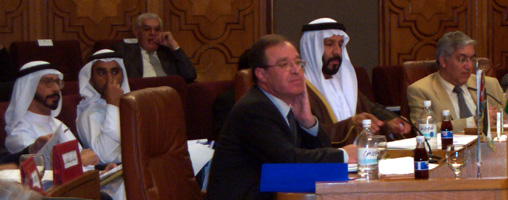 |
Jordanian
Minister of Planning Jawad Hadid
|
|
Fahd
Ben Abdullah Al-Seond after the closure of the meeting
(left) and Prince Lincoln
Marais, Department of Foreign Affairs, WSSD Substance Unit, South
Africa
speaks with the GEF representative (right)
|
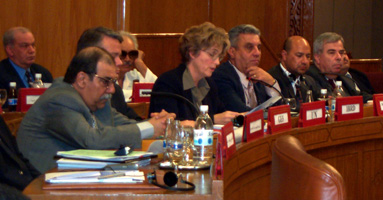 |
 Kathleen
Abdalla, UNDESA, on behalf of Under Secretary General Nitin
Desai, spoke on the world's changes since Rio, noting current key
issues of managing the challenges of globalization, persistence
of armed conflicts, and making sustainable development operational,
translating concepts into practices. Calling for renewed commitments
to Agenda 21, she stressed the importance of national and regional
preparations for the Johannesburg Summit.
Kathleen
Abdalla, UNDESA, on behalf of Under Secretary General Nitin
Desai, spoke on the world's changes since Rio, noting current key
issues of managing the challenges of globalization, persistence
of armed conflicts, and making sustainable development operational,
translating concepts into practices. Calling for renewed commitments
to Agenda 21, she stressed the importance of national and regional
preparations for the Johannesburg Summit. |
|
Emad
Adly, Arab Network for Environment and Development (RAED)
speaks with Kathleen Abdalla, UN DESA, and ENB team members. Abdu
Al Assiri, UNEP/ROWA speaks with ENB writer Alison Ormsby, Hosny
Khordagui, ESCWA, and Kathleen Abdalla, UN DESA (right)
|
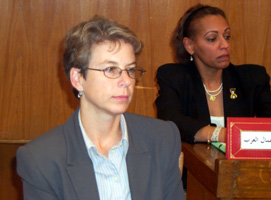 |
 UNDP
stressed the importance of poverty eradication and the need for
globalization to work for the poor; recalling the UNDP contribution
toward sustainable development amounting to USD195 million per year.
She also noted WSSD-related activities undertaken by UNDP's Capacity
21 programme and the potential areas for future action and called
for action, particularly in regard to capacity building, linking
global to local issues, climate change and energy and lasting peace
and security in the region. She said UNDP can assist in ensuring
the participation of the planning,
trade and economy ministries
of in the WSSD process.
UNDP
stressed the importance of poverty eradication and the need for
globalization to work for the poor; recalling the UNDP contribution
toward sustainable development amounting to USD195 million per year.
She also noted WSSD-related activities undertaken by UNDP's Capacity
21 programme and the potential areas for future action and called
for action, particularly in regard to capacity building, linking
global to local issues, climate change and energy and lasting peace
and security in the region. She said UNDP can assist in ensuring
the participation of the planning,
trade and economy ministries
of in the WSSD process. |
|
|
 The
Global Environment Facility (GEF) (center) noted accelerated
environmental degradation in recent times, expressed interest in
broadening partnership in the Arab region based on what we learn
here and at other regional meetings, and to work with member States
and stakeholders in providing catalytic action. The
Global Environment Facility (GEF) (center) noted accelerated
environmental degradation in recent times, expressed interest in
broadening partnership in the Arab region based on what we learn
here and at other regional meetings, and to work with member States
and stakeholders in providing catalytic action. |
Jordanian
Minister of Planning Jawad Hadid talks with Jenny Mandel, ENB,
and Kathleen Abdulla, DESA
|
|
|
Displays
in the corridors
|

 West
Asia Meetings West
Asia Meetings
 United
Nations Economic and Social Commission for Western Asia United
Nations Economic and Social Commission for Western Asia
 League
of Arab States League
of Arab States
 Linkages
Introduction to the Johannesburg Summit 2002 - the essential CSD primer
to the Summit Linkages
Introduction to the Johannesburg Summit 2002 - the essential CSD primer
to the Summit
 Linkage's
Portal to the Johannesburg Summit 2002 - access coverage of all WSSD
Regional Preparatory meetings; background info on the CSD process, introduction
to the Summit, UNCED history, the GA resolution; Who's Who; Publications;
Calendar of Events; Preparations at the global, regional, sub-regional,
national, and local levels; and other online resources Linkage's
Portal to the Johannesburg Summit 2002 - access coverage of all WSSD
Regional Preparatory meetings; background info on the CSD process, introduction
to the Summit, UNCED history, the GA resolution; Who's Who; Publications;
Calendar of Events; Preparations at the global, regional, sub-regional,
national, and local levels; and other online resources
 ENB
Coverage of the First Preparatory Session of the World Summit on Sustainable
Development ENB
Coverage of the First Preparatory Session of the World Summit on Sustainable
Development
 ENB
Coverage of the UNECE Regional Ministerial Meeting for the World Summit
on Sustainable Development ENB
Coverage of the UNECE Regional Ministerial Meeting for the World Summit
on Sustainable Development
 South
Africa Summit Site South
Africa Summit Site
 UN
Official Summit Website UN
Official Summit Website
 Asia
Pacific Region WSSD site Asia
Pacific Region WSSD site
 UNECE
Region's website for the WSSD UNECE
Region's website for the WSSD
 African
Regional Preparatory Process African
Regional Preparatory Process
|